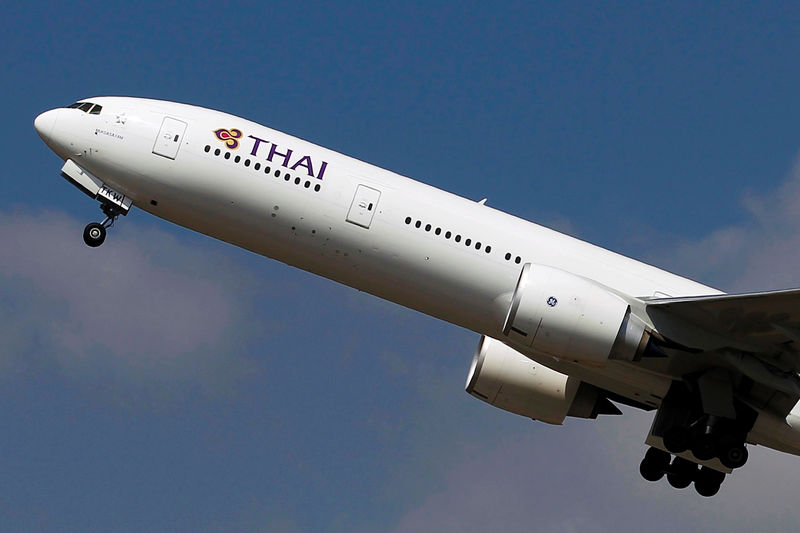By Khettiya Jittapong and Manunphattr Dhanananphorn
BANGKOK (Reuters) - Thai Airways International Pcl (BK:THAI) is likely to miss its annual cost-reduction target, but will swing to a profit for 2016 after three straight years of losses due to lower fuel costs, a top company executive said on Monday.
The flag carrier is one of several state-controlled firms undergoing reform in the country since the military seized power in May 2014. Over the past two years, it has cut unprofitable routes, while a plunge in oil prices (LCOc1) has provided it a tailwind by lowering its single-biggest expense - jet fuel.
However, it has fallen short of its target to cut expenses by 10 percent for the year as "cost reduction plans have not been fully implemented", Thai Airways' chief financial officer (CFO), Narongchai Wongthanavimok, told Reuters in an interview.
The company's total operating expenses fell by 7.9 percent over the first nine months of the year, he said.
Hit by fierce competition and a weak economy, Thai Airways has reported annual losses since 2013. But the outlook has improved this year, underpinned by restructuring and lower fuel costs. Last week, the carrier posted third-quarter results, which showed losses narrowing from year-ago levels.
Thai Airways expects a profit in the fourth quarter as more people travel during the holiday season, Narongchai said. This is in line with what analysts have been expecting.
While Thai Airways does not plan to introduce new routes, it aims to increase the frequency of its existing profitable flights in major cities in Europe and Southeast Asia to boost revenue over October to December, Narongchai said.
In 2017, the firm will take delivery of seven new planes, including the purchase of two Airbus 350-900s and five under-lease contracts, while decommissioning two old ones in a bid to expand its fleet and keep maintenance costs low, the CFO said.
This will bring the number of planes in its fleet to 99 by the end of next year, versus 94 now, he added.
In order to maximise profits in the long term, the airline needs to boost passenger yields, especially in the domestic market where the price competition is intense, Narongchai added. The airline is currently working on a 10-year business plan.
As part of its long-term strategy, Thai Airways will look to hike its online sales, which currently account for only 13-14 percent of its total ticket sales, compared with about 30 percent for Singapore Airlines (SI:SIAL) and more than 50 percent for budget carriers, he said.
On the debt front, the firm plans to seek low-interest foreign loans, such as in the Swiss franc, to restructure foreign debt worth around 15 billion baht ($423.73 million), which should help cut interest expenses by 300 million baht a year, he said.
Thai Airways shares have more than doubled this year, outperforming a 15-percent rise for the main Thai stock index (SETI).

($1 = 35.4000 baht)